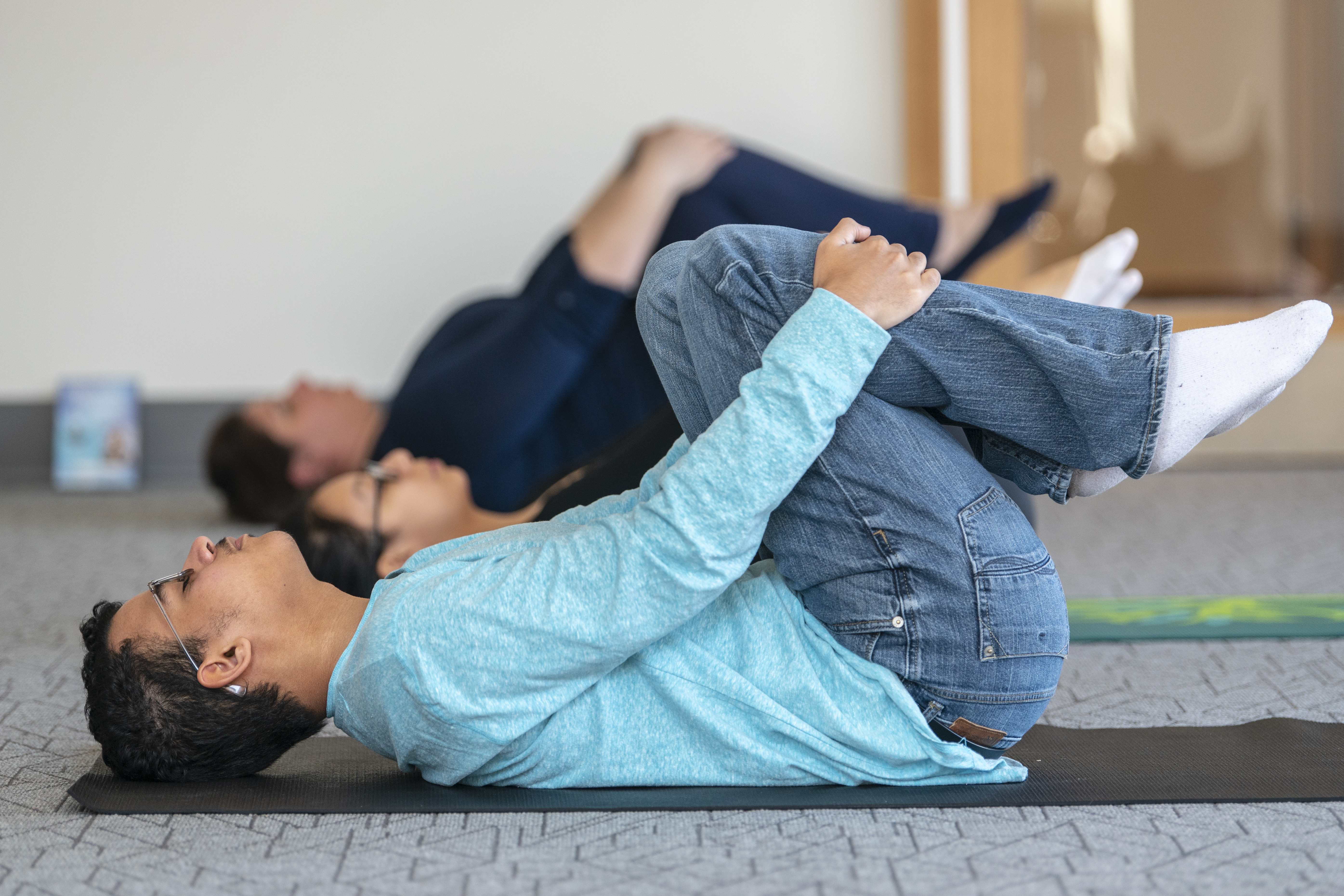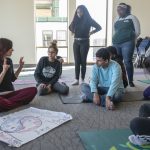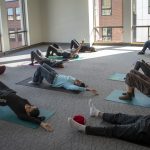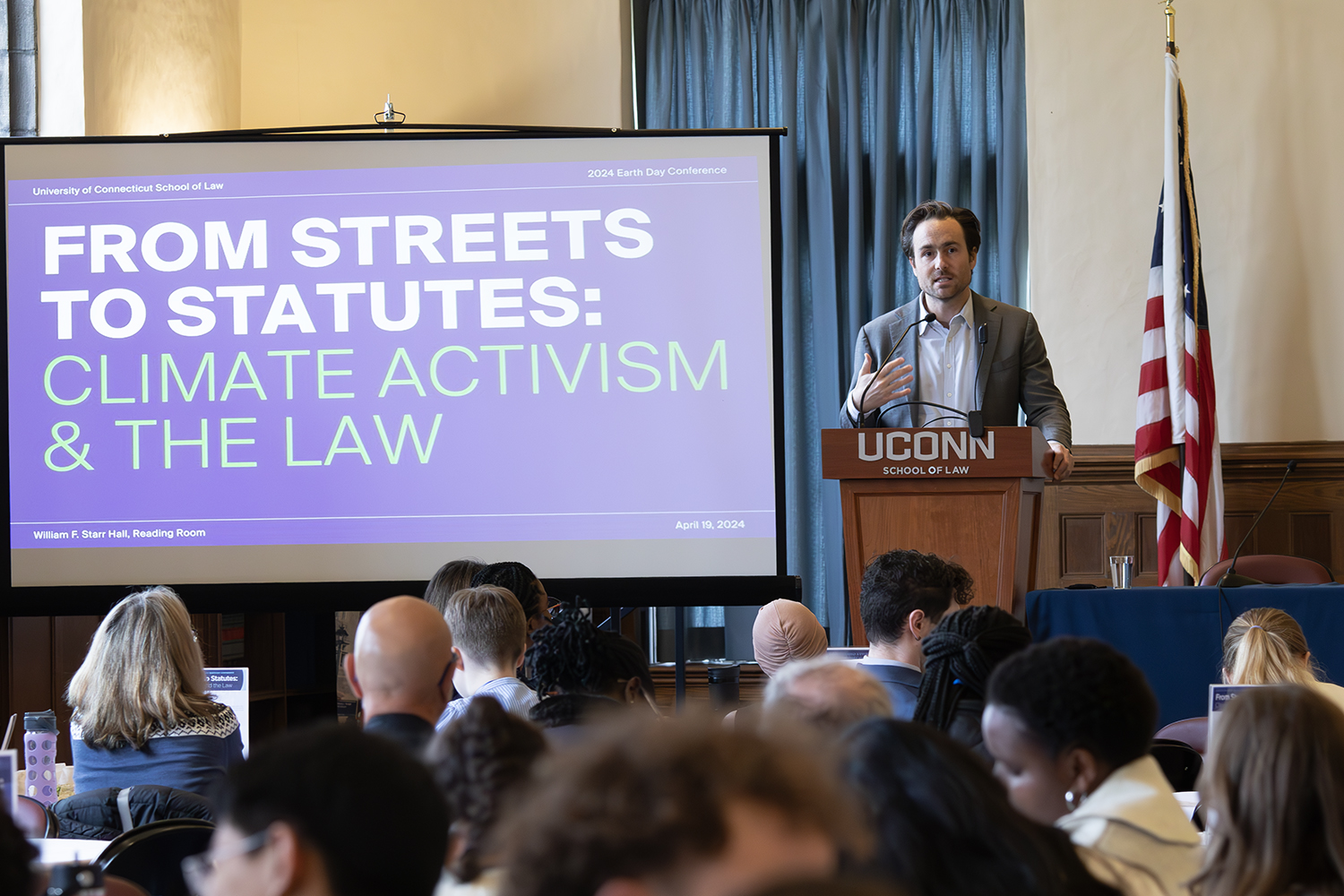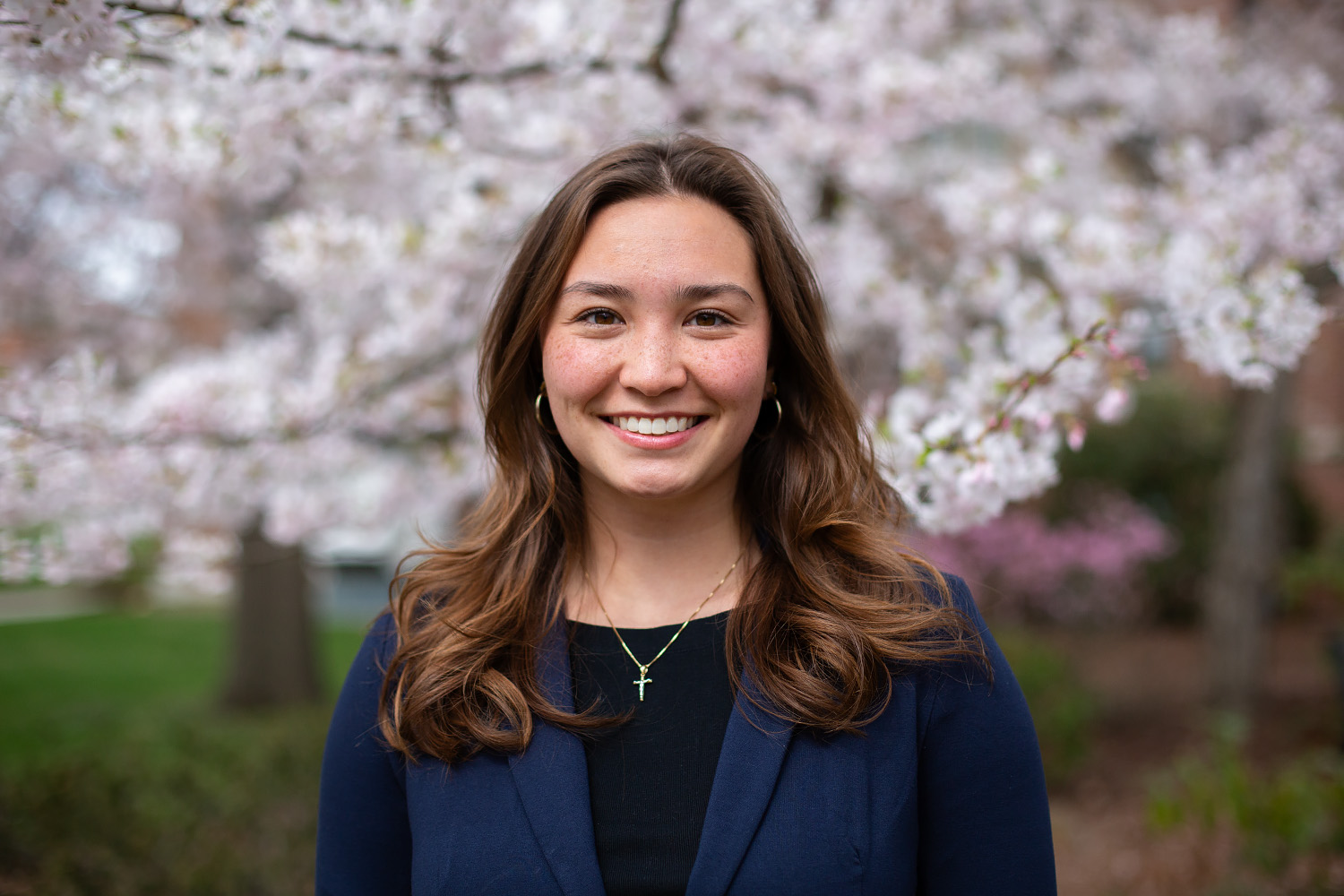The classroom at UConn’s Hartford Times building is like any other: bare walls, the sounds of the city bustling outside muffled to white noise, and natural daylight from a long bank of windows illuminating the quiet of the ongoing session inside. But unlike most other classes, the 16 participants sit scattered about the room in blue-fabric swivel chairs, their eyes closed, their hands comfortably resting palms-up in their laps or on the desks before them.
For two whole minutes, they sit in stillness as they are guided through a deep breathing exercise.
“Your only focus is on your breathing,” says Bradley Biskup, a physician’s assistant and coordinator of UConn Health’s Lifestyle Medicine Clinic, who is a guest speaker at this session of the Resilience through Mindfulness class.
“Breathe in as much as you can,” he says softly.
“Slow. Let all that air go.”
The unusual scene is part of the brainchild of Lynn Papacostas Ginolfi, a student counselor and the Hartford regional coordinator of UConn’s Student Support Services (SSS) program, which provides first-generation, low-income, and underrepresented populations of students with access to the University, services to support their graduation goals, and programs to enhance their growth at UConn and beyond. UConn’s SSS is a Federal TRIO Program, which provides opportunities for academic development, assists students with basic college requirements, and motivates students toward the successful completion of their postsecondary education.
In her role as a coordinator and counselor, Papacostas Ginolfi provides one-on-one advising and support to students who are often facing personal or economic challenges in addition to the rigors of higher education. Papacostas Ginolfi – who at one time was herself a first-generation, low-income TRIO student, and has been working with similarly situated students for more than 19 years – said she created the Resilience through Mindfulness course to help address what she has seen as an unmet need among her students.
Students are not fully able to receive the information that they are learning in the classroom because their stressors prevent them from being able to be present in the here and now. — Lynn Papacostas Ginolfi
“I believe all students have the ability to learn and thrive, but often what I see is that stress causes a blockage and a barrier in the learning process,” says Papacostas Ginolfi. “Students are not fully able to receive the information that they are learning in the classroom because their stressors prevent them from being able to be present in the here and now. They have no time for self-care, so through this course, I’m offering them a space in their lives to do that.”
Enter mindfulness – a growing secular practice that involves focusing on the present and often includes meditation, movement, sound, and breathing exercises. Studies have shown positive changes in both physical and mental health as a result of mindfulness practice, including improved immune system response; reduced negative emotions and stress; and improved memory, attention, and decision making.
Papacostas Ginolfi has long practiced and felt the benefits of mindfulness in her own life, but she has kept her personal practice separate from her professional work. Her students, though, would frequently come to her with more than their academic problems.
“They have to study for a test, but then something dramatic comes up in their personal life,” she says. “Students come in for academic advising, but they talk about everything, because it’s all connected. In helping students feel better, they will naturally do better in all areas of their lives. In my work, I am always trying to find more tools for my students’ tool belts for success.”
It was a natural next step for her to create this course.
While centers and institutes for mindfulness are popping up at public and private universities around the country, the Hartford class is the only mindfulness offering currently available at UConn, and its official capacity was limited to 12 students in the SSS program for its inaugural semester, though guests have been invited to attend some of the weekly sessions. So far, classes have focused on academic resiliency, breathing, gratitude, meditation and movement, yoga, and the science and health benefits behind mindfulness.
In addition to the classroom, students keep weekly journals and conduct research on mindfulness, learning about different techniques from articles that they find, and discussing the benefits and drawbacks of those techniques in order to help them develop their own meaningful and beneficial practice.
“What I’m trying to do is bring them through a journey of self-awareness so that they can find and identify the tools that will best help them daily,” Papacostas Ginolfi said. “Being from a low-income and/or first-generation family or household, it’s all about survival, and no one is really teaching you self-regulation or healing methods to support you with sustaining yourself or your resiliency. We are all different and connect to life differently, and it’s important that our practice is unique to each of us as individuals.”
If you know how to connect to yourself, you’ll be able to better connect to others and to the world around you. — Lynn Papacostas Ginolfi
Students enrolled in the class say they are already experiencing benefits in their personal and academic lives.
Tonya Gray ’20 (CLAS) says the class has taught her the importance of breathing and paying attention to the moment, and that she has started incorporating deep breathing exercises into her morning routine.
“I’m graduating next year, so I’m constantly worrying about my future,” Gray says. “I have no idea where the future’s going to lead me, and you know, you’re constantly thinking, I need to get this class in, I need to get that class in, I need to graduate on time, I need to get this grade. It has helped me to realize that the future will come, but I just need to focus on the present.”
Last semester, Xena Hodgdon ’22 (ACES) struggled under a load of difficult courses and personal issues.
A self-described “stressful person,” Hodgdon says journaling has provided a way for her to let out her feelings, and that breathing exercises have helped her in situations even outside the classroom, like when a recent wrong turn in Hartford brought on an overwhelming wave of anxiety.
“I was driving by myself, and I don’t know Hartford. I was driving with GPS, and my GPS was loading, so I took a wrong turn and I got anxiety, I got really bad anxiety,” she says. “So … I stopped to the side, and I breathed. … It helped me a lot.”
Daviel Garcia ’22 (ACES) says that low grades on midterms last semester added to an already high stress level that he carried with him from his senior year in high school. Using techniques he’s learned in class – including purposefully taking breaks while studying, to help him better retain information – have helped improve his academic performance.
“The first time I took a midterm, I’d been getting Cs and Ds, and that really hit me hard,” he says. “But ever since I took this class, classes I thought were going to be hard for me – especially Calculus 2, because Calculus 1 was hard for me – I just took a test for Calculus 2 and it went through easy. I’m getting 90s. And I just feel like, this removing stress from yourself actually benefits you for the future.”
Papacostas Ginolfi doesn’t see mindfulness as a cure-all for struggling students, and hopes to learn from the students’ performance this semester in order to evaluate and improve the course offering in the future. But she says she believes in the potential for mindfulness to help her students better navigate their own challenges.
“If we can get these students to pause in the present moment, and to come to a place of self-love and compassion,” she says, “can you imagine when they graduate and go out into the world, how they’re going to be in that roundtable, when they’re sitting with other executives, or their peers, or in the school systems, or wherever their journey may take them? Developing a self-regulating practice will support us in being more resilient to whatever may come our way. If you know how to connect to yourself, you’ll be able to better connect to others and to the world around you.”
